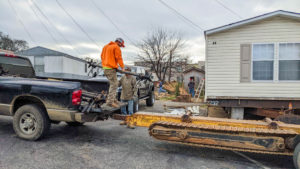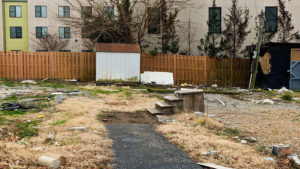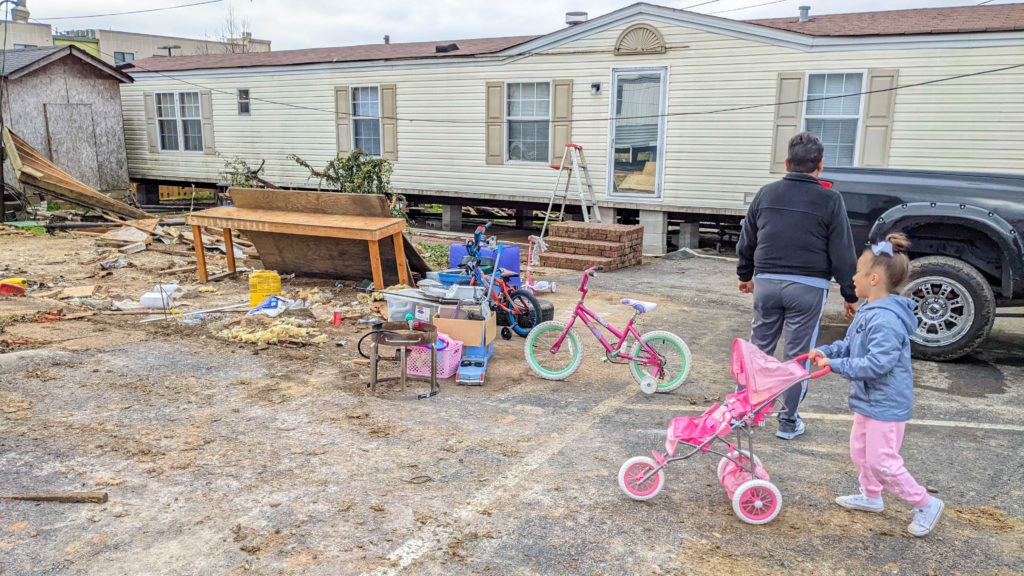
If you had crossed the threshold of Francisco J. Rios’ home in mid-November, you’d be greeted with a warm welcome and an immediate cozy feeling.
Soft light filled the living room. Family photos crowded the mantle.
 Alexis Marshall WPLN News
Alexis Marshall WPLN NewsRios sits in his armchair in the living room of his trailer in November 2021. Soon, it would be emptied out and moved away from Nashville.
Rios said he lived in this trailer for 18 years at the WC Mobile Home Community, and before that, he lived in one just a few doors down.
Except now, his trailer is empty.
That’s because, last summer, the landlord of the trailer park gave notice that he was selling to a developer. Originally, residents had just a couple months’ notice to move out. Many had lived there for decades. But they organized to get an extension, and a tenants’ union even negotiated a $200,000 settlement with the developer.
Now, the deadline has passed for the remaining families at the mobile home community on Dickerson Pike to move out.
Leaving home
Rios moved to WC in 1998. He has a lot of cherished memories here.
“Qué más feliz que ver crecer a mis hijas, ver crecer a mis nietos? Que los amo y yo por ellos peleo día y noche,” Rios said.
(“What’s happier than watching my daughters grow up, watching my grandkids grow up? I love them and fight for them day and night.”)
This is the place he’s celebrated countless holidays and birthdays. Where he watched the little ones play outside with the neighbors, and with the neighborhood cat, Scratchy, who his granddaughter, Aubree, is especially fond of.
 Alexis Marshall WPLN News
Alexis Marshall WPLN NewsRios’ granddaughter, Aubree, hugs Scratchy, a cat that lived at the WC Mobile Home Community.
She was playing with the cat on a windy December morning while, nearby, workers installed axles and tires to the empty trailer. They were prepping it for a 50-mile journey eastward to Hartsville, where Rios is buying a plot of land.
 Alexis Marshall WPLN News
Alexis Marshall WPLN NewsWorkers prep Rios’ trailer to be moved to Hartsville, Tenn.
Rios said it’s going to be a tough move. The developer is covering the cost of moving the trailer. But the lot it’s going to doesn’t have water, sewage or power yet. He’ll pay thousands to get the utilities installed.
On top of that, Rios will have a long commute to his job installing ceramic tiles. That’s more money on gas and less time with his family. It’s also a problem because Rios and his wife are both losing their vision.
Rios has diabetes and glaucoma. He said he’s already lost a lot of the vision in one eye. He and his wife have both been getting expensive surgeries.
More than a money issue
The family’s displacement is causing more than just financial stress.
“Es mi patrimonio,” Rios said.
Rios feels like this home is his heritage — his legacy.
That’s a common feeling, according to Mindy Thompson Fullilove. They’re a social psychologist who studies the ties between people’s environments and their mental health. They say that when people are moved out of their communities, they lose a lot more than just a house. They lose their support networks, too.
“If you’re short on money, your relatives in a faraway, other place can send you some money,” they said.
 Alexis Marshall WPLN News
Alexis Marshall WPLN NewsA set of concrete steps leads to an empty lot where one of Rios’ neighbors used to live.
“But if you have the flu and you need somebody to bring you some soup, your relatives far away can’t bring you soup. So, it’s who’s next door that could bring you some soup or help out, you know, walk your dog or other kinds of things.”
Thompson Fullilove said, in some ways, these communities are irreplaceable, especially if there isn’t another affordable option nearby.
There have been a few notable cases of displacement recently. In Clarksville, 300 mobile home residents were forced to move out last year after the landowner decided he wanted to redevelop the site. And in another local case, HUD will decide whether a Section 8 apartment complex in East Nashville can be demolished and relocated to make way for a mixed-use development.
The power of a tenants’ union
Residents are often displaced with no compensation. But the tenants’ union at WC negotiated a settlement, and it included money for those who had already left the park — a key sticking point for residents. Thompson Fullilove said the union’s organizing reflects something profound.
“Every union movement in the United States that’s been successful, has been successful because of solidarity — because people understood that they would get more together than they would if they were allowed to be divided,” they said. “And at the heart of all the progress in America is the moment when people say we have to stand in solidarity with one another.”
A new beginning
Rios says he and his wife will be staying in an apartment for now with his daughter and granddaughter.
 Alexis Marshall WPLN News
Alexis Marshall WPLN NewsChildren’s toys were among the last things the Rios family packed up from their shed.
As he packed up the last of their things from the shed out back, Rios’ wife, Maria, got to talking. She said she was sad and stressed out, but that the family was trying to treat the move like a new beginning.
“Vamos a tomarlo como un nuevo comienzo,” she said. “Entonces hay que seguir trabajando, luchando pues para estar aquí simplemente.”
(“So we have to keep on working and fighting, simply for the ability to be here.”)
Rios said he has no clue how long it will take to get his new plot of land in living condition. But the next place his trailer is parked will be the last one.
“Sí, esperemos que sí,” he said. “Va a ser el ultimo. Y de ahí al panteón.”
He said he hopes so and then, from there, to his final resting place. In the new spot, where he’s the owner, he said there won’t be anybody who can force him out again.

